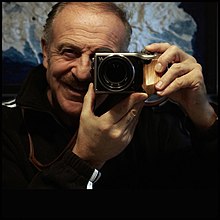Augusto De Luca
This article has multiple issues. Please help improve it or discuss these issues on the talk page. (Learn how and when to remove these messages)
|
Augusto De Luca | |
|---|---|
 Augusto De Luca in 2015 | |
| Born | July 1, 1955 |
| Nationality | Italian |
| Education | Law[1] |
| Known for | Unique portrait style |
| Awards | Città di Roma prize, 1996 |
Augusto De Luca (Napoli, 1 July 1955) is an Italian photographer specialized in portraits.[2][3][4]
Biography
[edit]After a conventional high school education, he enrolled in university and obtained a law degree. In the mid-1970s, his interest in photography led him to become a professional photographer.[5][6] He then began to work in traditional photography and portraiture[2][3] but also for experimental photography[4] experimenting with a wide variety of materials. His style is characterized by a particular attention to highlighting the smallest expressive details of the framed object. His work includes images of pure realism, as well as others in which forms and signs combine according to indications inspired by the philosophy of metaphysics.[6]

He has exhibited in a number of Italian and foreign galleries, museums and institutional headquarters, including the Italian Chamber of Deputies in Rome. During his career, he has also produced record covers, billboards and photography books.[5][6]

In 1987, he directed the scenes for the television program Samarcanda directed by journalist Michele Santoro. He taught the art of photography at the Montecitorio Club of the Italian Chamber of Deputies.[7]
His books have been featured in essays, specialized magazines, and theme programs on Italian television Rai 2,[8] and Rai 3[9] are introduced in their preface or explanatory texts by cultural figures such as poet Mario Luzi, director Lina Wertmuller, historian Giovanni Pugliese Carratelli, journalists Maurizio Costanzo and Sandro Curzi, architect Paolo Portoghesi, composer Ennio Morricone.
In 1995, an exhibition of his photographs at the Italian Chamber of Deputies was inaugurated by President Giorgio Napolitano and the "Onorevoli" parliamentarians Nilde Iotti and Carlo Azeglio Ciampi.[6]
In 1996, he was awarded the "città di Roma" prize for the photographs in the book Roma Nostra[10] and composer Ennio Morricone for the poem "Roma Amore" published in the same book. Augusto De Luca returned to Naples around 2005, after living in Rome, he became particularly interested in graffiti.[5]
Books
[edit]- (1986) Napoli Mia.(Centro Il Diaframma / Canon Edizioni Editphoto Srl)
- (1987) Napoli Donna.(Centro Il Diaframma / Canon Edizioni Editphoto Srl)
- (1995) Trentuno napoletani di fine secolo. Electa, Naples, ISBN 88-435-5206-6
- (1996) Roma Nostra. Gangemi Editore, Rome, ISBN 978-88-7448-705-9
- (1997) Napoli grande signora. Gangemi Editore, Rome, ISBN 978-88-7448-775-2
- (1998) Il Palazzo di giustizia di Roma. Gangemi Editore, Rome, ISBN 978-88-492-0231-1
- (1998) Firenze frammenti d'anima. Gangemi Editore, Rome, ISBN 978-88-7448-842-1
- (1999) Bologna in particolare. Gangemi Editore, Rome, ISBN 978-88-7448-980-0
- (2000) Milano senza tempo. Gangemi Editore, Rome, ISBN 978-88-492-0093-5
- (2001) Torino in controluce. Gangemi Editore, Rome, ISBN 978-88-492-0211-3
- (2002) Tra Milano e Bologna appunti di viaggio. Gangemi Editore, Rome, ISBN 978-88-7448-980-0
- (1992) Swatch Collectors Book 1. Editore M. Item — Switzerland, ISBN 88-86079-01-X
- (1992) Swatch Collectors Book 2. Editore M. Item — Switzerland, ISBN 88-86079-00-1
References
[edit]- ^ https://divisare.com/authors/2144741162-augusto-de-luca
- ^ a b "Augusto De Luca – Ritratti Famosi". EduEDA – The EDUcational Encyclopedia of Digital Arts.[user-generated source?]
- ^ a b "Augusto De Luca fotografa Carla Fracci". EduEDA – The EDUcational Encyclopedia of Digital Arts.[user-generated source?]
- ^ a b "Colore – Augusto De Luca – Fotografie". EduEDA – The EDUcational Encyclopedia of Digital Arts.[user-generated source?]
- ^ a b c Simone Stefanini (4 October 2018). "La strana storia di Augusto De Luca, il cacciatore di graffiti". Daily Best (in Italian).
- ^ a b c d "Augusto De Luca". ND Magazine (in Italian). 16 December 2013.
- ^ "Augusto De Luca: Spaces & Sculptures". Befront Magazine. 3 April 2018.
- ^ "AUGUSTO DE LUCA : SERVIZIO AL – TG 2 – SUL LIBRO "NAPOLI DONNA"" – via www.youtube.com.
- ^ "AUGUSTO DE LUCA : SERVIZIO AL TG3 SUL LIBRO "FIRENZE FRAMMENTI D'ANIMA"" – via www.youtube.com.
- ^ Prix " Città di Roma" 1996 avec le compositeur Ennio Morricone – Corriere della Sera – Galerie des images
External links
[edit]- "Augusto De Luca/Photographer Interview".Ragazine Magazine
- "La fotografia creativa nella Napoli degli anni '80" (in Italian).L’Amletico
- "Da fotografo dei divi a cacciatore di graffiti, una vita piena d'arte" (in Italian).la Repubblica
- "Sculpture and Architecture Series by Augusto De Luca".ArchEyes | Timeless Architecture
- "Fotoserie 'Firenze' van Augusto De Luca" (in German).Photofacts
- "Intervista ad Augusto De Luca" (in Italian).The Passengers Times art
- "Augusto De Luca".WeVux
- "Augusto De Luca captura en sus retratos lo extraordinario de la humanidad" (in Spanish).Cultura Inquieta
- "La fotografia come atto creativo negli scatti di Augusto De Luca" (in Italian).To Arch Magazine
- "Art skulls by Augusto De Luca".Theme of Absence
- "Augusto De Luca: Intervista al genio napoletano della fotografia" (in Italian).Napoli a teatro
- 1955 births
- Italian photographers
- Photographers from Naples
- Living people
- Artists from Campania
- People from Naples
- Artists from Naples
- Portrait photographers
- Architectural photographers
- 20th-century Italian photographers
- 20th-century Italian male artists
- Italian contemporary artists
- 21st-century Italian photographers
- 21st-century Italian male artists
